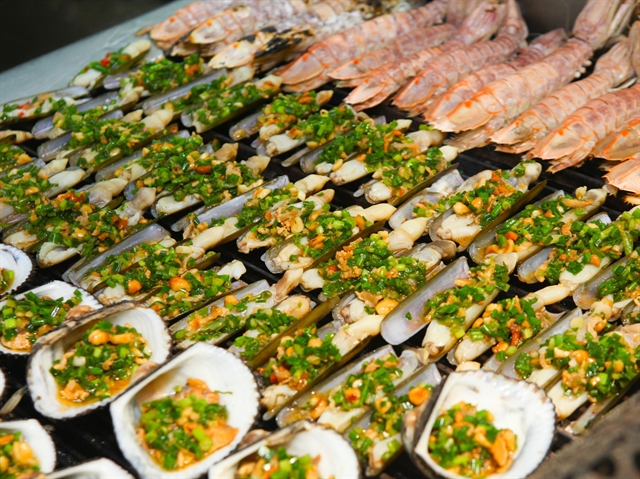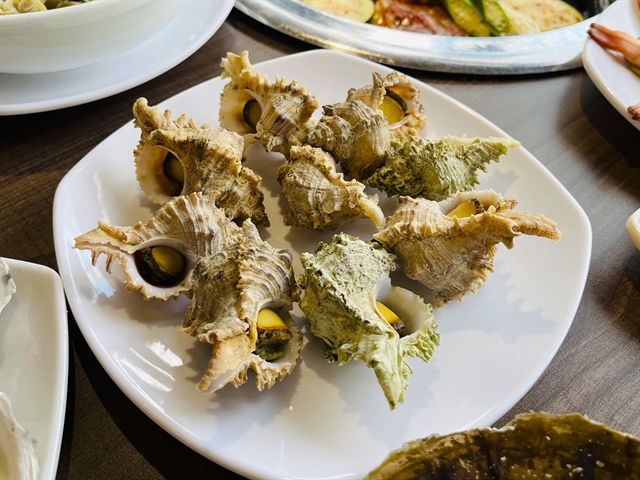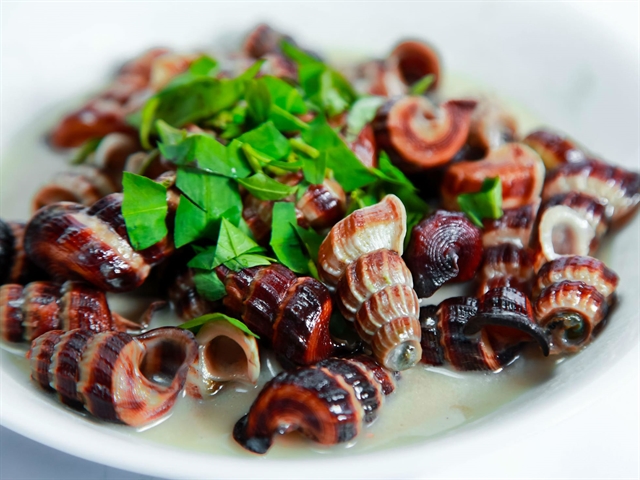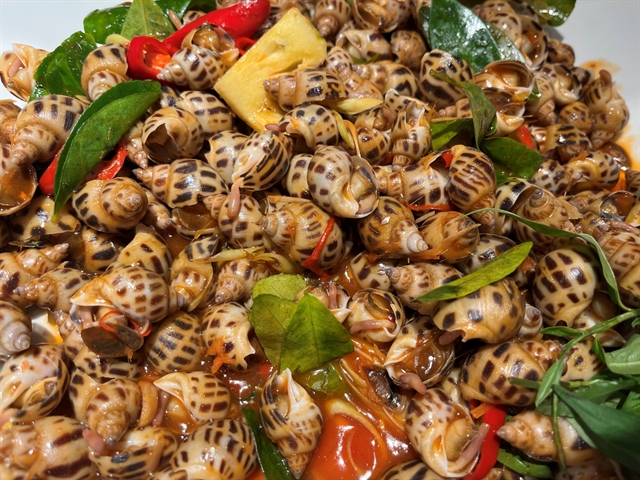By Thu Hà
Almost all Vietnamese who are interested in dishes cooked from seafood will try snails for a tasty great, fragrant and rich in nutrition dish, said Master Chef Phạm Tuấn Hải.
Snails are also a speciality that draw in visitors and the wide number of variations have helped put Việt Nam cuisine on the world culinary map.
The many ways they can be cooked, in a large variety of dishes, have also encouraged chefs to create a lot of cooking recipes to serve foodies, the chef added.
Hải said Việt Nam has abundant seafood resources from its large sea, long sea banks and dense canals, where fishermen can easily net their catch, hence all seafood, including snails, becoming a popular and favourite food of almost Vietnamese.
There are so many sorts of snails. They include spotted Babylon snail, razor clam, cactus spiny snail, mud creeper sea snails and several others.
Chefs can cook them into many dishes, such as fried snail in sour and sweet sauce, roasted, grilled, boiled, steamed snails and snail salad, all with affordable prices compared with other seafoods.
Among them, spotted Babylon snail is the most sought after at restaurants and hotels because it has its own characteristic flavour and is particularly fragrant and crispy. “This kind of snail brings to the table an unforgettable feeling and taste,” Hải said.
Chef Hải said fried spotted Babylon snail with tamarind (locally known as ốc hương xào me) is popular with gourmets because of its pleasing and fatty taste mixed with the sour and sweet of the tropical fruit sauce.
 |
Younger foodies are particularly interested in steamed spotted Babylon snail with lemongrass, with cheese sauce or simply fried with salt and chilli, he said, adding that its price ranges from VNĐ450,000 and up, depending on its freshness and its size.
TasteAtlas last month recognised spotted Babylon snail fried with lemongrass and chilli, locally known as ốc hương xào sả ớt, as being among top 100 tastiest fried dishes in Asia.
Apart from spotted Babylon snail, food lovers also enjoy dishes cooked with razor clam, which is in a cylinder form between six and ten centimetres long. It looks like a fingernail, with a light brown cover and containing soft white meat.
 |
“I like this kind of snail for its coolness and it is firm and sweet. Not only that it is rich protein, vitamin and Omega 3,” said visitor Dương Quang Nghị, adding that he likes to enjoy roasted razor clam with pork fat and onions and razor clam fried with morning glory.
Nghị said he has also tried cactus spiny snail with its hard shell covered with small thorns. It is a famous specialty of Phú Quốc Island for its rich sweet taste and unusual looks.
Nghị, from Los Angeles, US, recently visited the island and now raves about the dish. “When putting a piece into my mouth to slowly chew it you immediately experience its crispy, rich fatty texture. If you then chose to dip the snail in a bowl of mixed salt, lemon and pepper, it is even more enjoyable so that’s why people call it the delicacy of the earth.”
There are many ways to cook snails, such as steamed and boiled, in a salad or fried with garlic.
 |
Meanwhile, the jade snail is considered a specialty of Nha Trang. It has a white shell but shines like jade, hence the name and the flesh inside is the colour of milk, but firm and crunchy, said local Nguyễn Thị Nghiêm. He added that this type of snail can be eaten whole, compared with other snails, when diners have to remove the underneath before consuming.
Nghiêm said the snail tastes great and has an amazing flavour when frying it with morning glory, with garlic and butter or eating it with tamarind sauce.
“Specialties cooked with snails have helped to bring Việt Nam’s cuisine onto the world map, which also help to attract a lot of visitors and travellers to the country,” she said. ( Source: VNA)


